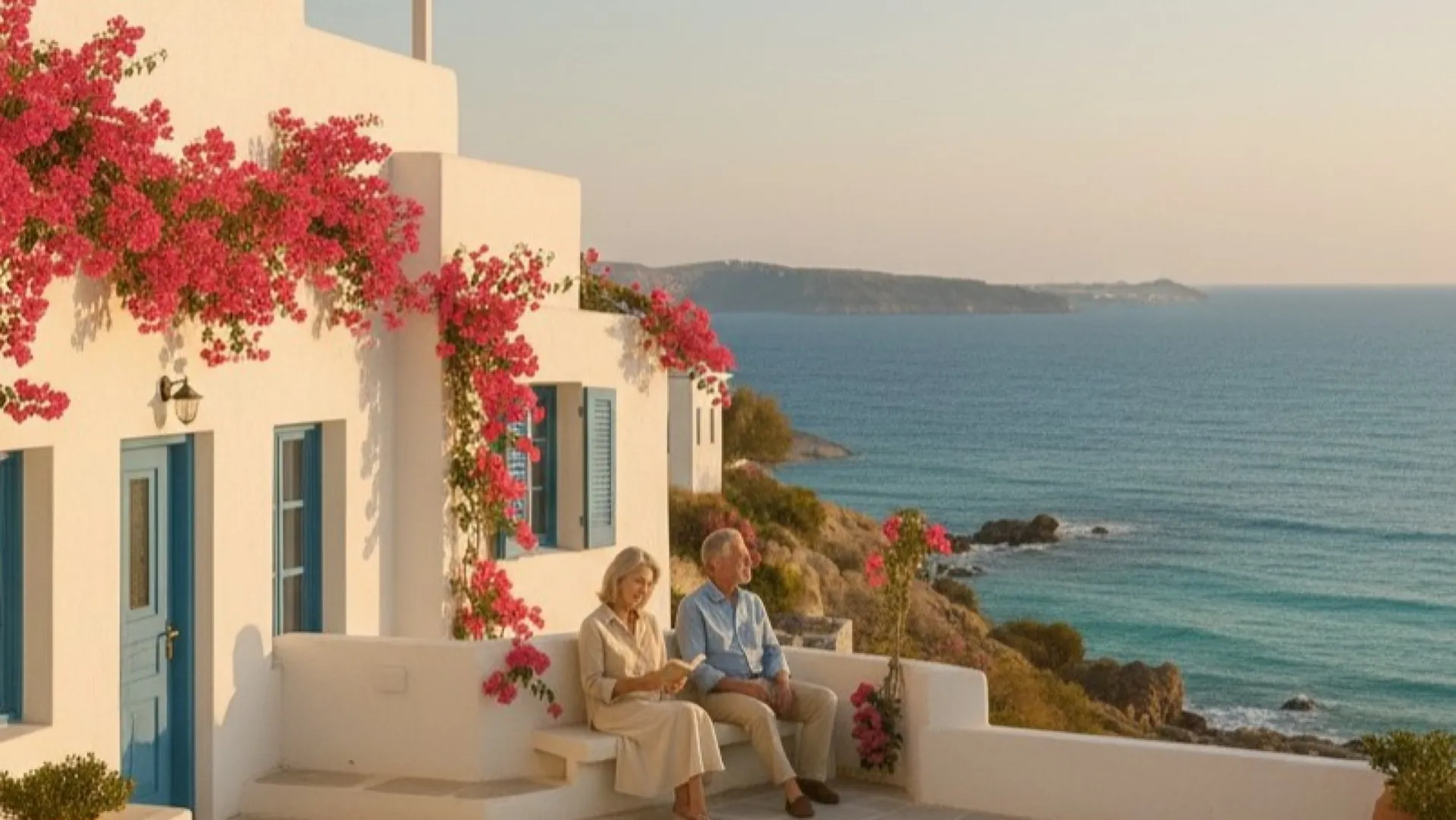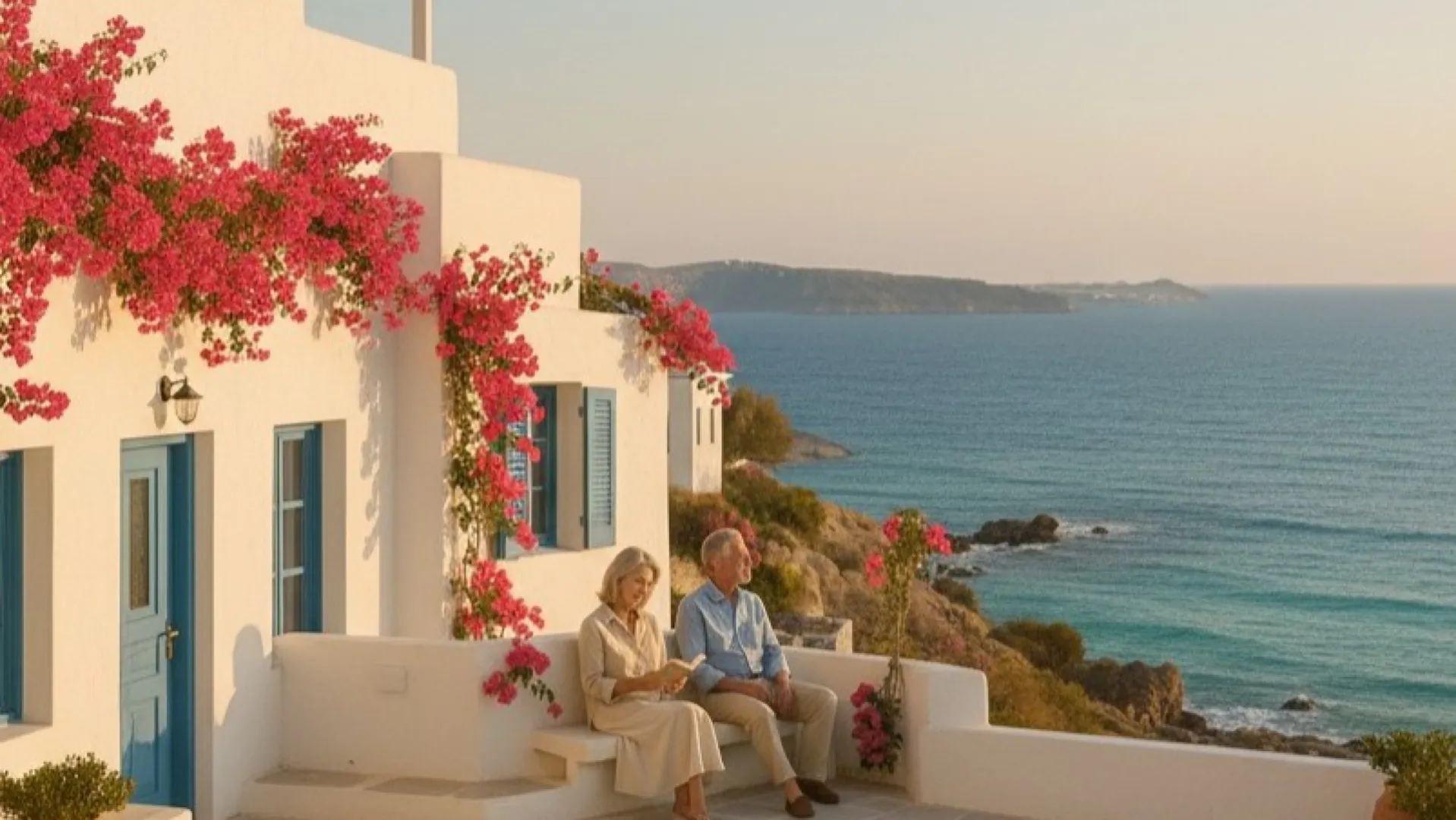




Margaret called me crying from her apartment overlooking the Mediterranean. Not tears of sadness, but of profound relief. "Vedat," she said, "I just realized I haven't felt my shoulder pain in three days. For the first time in five years, I woke up without pain."
She was three weeks into her Cyprus stay. And what happened to Margaret wasn't unique – it was predictable.
After hosting over 2,000 guests aged 50 and above, I've witnessed this transformation hundreds of times. The pattern is so consistent that I started documenting it. Then I discovered the science behind what I was seeing, and it changed how I think about travel entirely.
We've been conditioned to believe that a two-week vacation is generous – even luxurious. Take your annual holiday, recharge your batteries, and return to the grind. But here's what nobody tells you: your body is just beginning to relax when it's time to pack your bags and leave.
Dr. Jessica de Bloom from the University of Groningen studied thousands of vacationers and discovered something shocking. The happiness boost from a typical one-week vacation peaks on day eight. By the time you return home, the benefits have almost entirely evaporated.
"It takes the human body 11 days just to significantly reduce cortisol levels. Most people fly home on day seven."
But extend that stay to three or four weeks? That's when the magic happens.
I've watched this unfold with my own eyes, season after season. Here's the timeline I've observed with nearly every guest over 50:
You're still checking emails. Still walking fast. Still eating meals like you have a meeting in 20 minutes. Your body is on vacation but your nervous system hasn't received the memo yet.
Robert, a 62-year-old former CEO from London, described it perfectly: "The first week, I was pacing around the pool with my phone, looking for problems to solve. My wife finally hid it in the kitchen cupboard."
Something shifts. You stop waking up at 5:30 AM for no reason. The tension in your shoulders – the tension you didn't even know was there – starts to melt. You have your first truly deep sleep in months, maybe years.
This is when the science gets interesting. Research from Stanford's Center on Longevity shows that after 14 days of reduced stress, your body begins producing different hormones. Cortisol drops. Serotonin rises. Your inflammation markers – the ones linked to everything from arthritis to heart disease – begin to normalize.
This is when Margaret's shoulder stopped hurting. When James, the burnt-out financial consultant, started sketching again – something he hadn't done since art school. When Patricia and her husband had their first real conversation in years, not about kids or mortgages, but about dreams they'd forgotten they had.
"Week three, I found myself at the local market, chatting with the vendor in broken Greek, laughing at my own mistakes. The anxious executive who arrived two weeks earlier would have been mortified. But that person felt like a stranger now."
- David, 59, retired marketing director
You're not a tourist anymore. You have a favorite café where they know your order. You swim at the same time each morning, joining the informal group of locals who've adopted you. You're living, not vacationing.
This is where the lasting change happens. Studies published in the Journal of Travel Medicine found that people over 50 who stayed abroad for four weeks or more showed health improvements that lasted up to six months after returning home.
Here's the uncomfortable truth: as we age, our bodies become less efficient at managing stress. What a 30-year-old can shake off in a weekend might take someone over 50 weeks to recover from.
Dr. Sarah Chen, who studies aging and stress at UCLA, explains it this way: "The stress response system becomes 'stickier' with age. It takes longer to activate, but also much longer to deactivate. Extended breaks become not just beneficial, but necessary for cellular repair."
The numbers back this up:
Not all destinations are created equal for extended stays. The Mediterranean, particularly Cyprus, offers what I call the "perfect storm" of restoration factors.
First, there's the sun. Vitamin D deficiency affects 75% of adults over 50 in Northern Europe. Three weeks of Mediterranean sunshine can restore levels naturally – no supplements needed.
Then there's the pace. Nobody rushes here. Shops close for afternoon siestas. Dinners last three hours. This isn't laziness – it's a different philosophy of time that your stressed nervous system desperately needs to experience.
"In London, I ate lunch at my desk every day for 30 years. In Cyprus, I learned that lunch is meant to be sacred – a time to pause, to taste, to connect. This simple shift changed everything about how I approach my days now."
- Susan, 61, retired teacher
The diet plays a role too. Without trying, most of our guests lose 3-5 kg during their stay. Not from dieting, but from eating real food, prepared simply, enjoyed slowly. The Mediterranean diet isn't just healthy – it's anti-inflammatory, which matters enormously for joint pain, energy levels, and mental clarity.
Here's where it gets interesting. Extended stays are often cheaper than multiple short vacations. Let me show you the math from our 2024 data:
But the real savings? The health costs you avoid. One of our regular guests, Thomas, calculated that his extended stays save him roughly £2,000 per year in physio, massage, and pain medication. "My doctor jokes that Cyprus should pay him commission," he laughs.
I hear the same concerns every time someone considers an extended stay. Let me address them honestly:
Boredom is what happens when you're a tourist trying to tick boxes. When you're living somewhere temporarily, you develop rhythms. You discover the hidden beach the tourists don't know about. You take the cooking class with locals. You join the morning swimming group. Boredom transforms into something else entirely – peace.
Your family wants you healthy and happy more than they want you physically present and stressed. Plus, nothing stops them from visiting. Some of our best memories involve three generations sharing a villa, experiencing Cyprus together.
This might be the most important one to address. You've spent decades putting everyone else first. Your employer, your children, your aging parents. Taking four weeks to restore your health isn't selfish – it's necessary. You can't pour from an empty cup, and by 50, most of our cups aren't just empty, they're cracked.
"The greatest gift you can give your family is coming home as the person you were meant to be, not the stressed shadow they've gotten used to."
If you're reading this and feeling a pull – that mixture of yearning and fear that comes when we consider doing something different – here's how to start:
If four weeks feels impossible, start with three. It's the minimum for real restoration, and it's easier to negotiate with work, family, and your own resistance.
October-November and February-March are perfect for extended stays. The weather is ideal, the tourists are gone, and the rates are lower. Plus, you're escaping the worst weather at home.
You need a kitchen, a living room, a sense of home. Hotels are for vacations. Apartments are for living.
Resist the urge to island-hop or country-tour. Plant yourself in one place. Let roots grow, even shallow temporary ones. The magic happens when you stop moving.
After all these years of watching transformations, I've come to believe that extended travel after 50 isn't really about travel at all. It's about remembering who you are when you're not rushing, producing, achieving, or proving.
It's about discovering that your worth isn't tied to your productivity. That pleasure isn't something to be earned but experienced. That your body, given the chance, still knows how to heal itself.
"I came to Cyprus to escape the British winter. But what I really escaped was the person I'd become – always rushing, always worried, always tired. Four weeks later, I met myself again. Turns out, I quite like her."
- Janet, 64, retired nurse
The science supports what I've witnessed: extended stays don't just refresh you, they rewire you. New neural pathways form when you're exposed to novel experiences without overwhelming stress. Your microbiome changes when you eat different foods and swim in new seas. Your circadian rhythms reset when you live by the sun instead of the clock.
You return home different. Not just rested, but changed.
So here's what I ask everyone who's considering an extended stay: What's the cost of not doing this?
What's the cost of another year of morning stiffness, afternoon exhaustion, evening anxiety? What's the price of never knowing what your body feels like without chronic stress? What opportunities for joy, connection, and discovery are you trading for the familiarity of your routine?
You've earned the right to find out who you are when you're not in survival mode. You've earned the right to wake up without an alarm, to eat lunch without watching the clock, to swim in the sea on a Tuesday morning without guilt.
You've earned the right to remember what restoration actually feels like.
Join hundreds of travelers over 50 who've discovered the transformative power of extended stays in Cyprus.
Explore Your OptionsWe use necessary cookies including analytics to ensure our website works properly and to understand how to improve your experience. By continuing to browse, you accept our use of necessary cookies. Click "Accept All" for personalized content and offers.